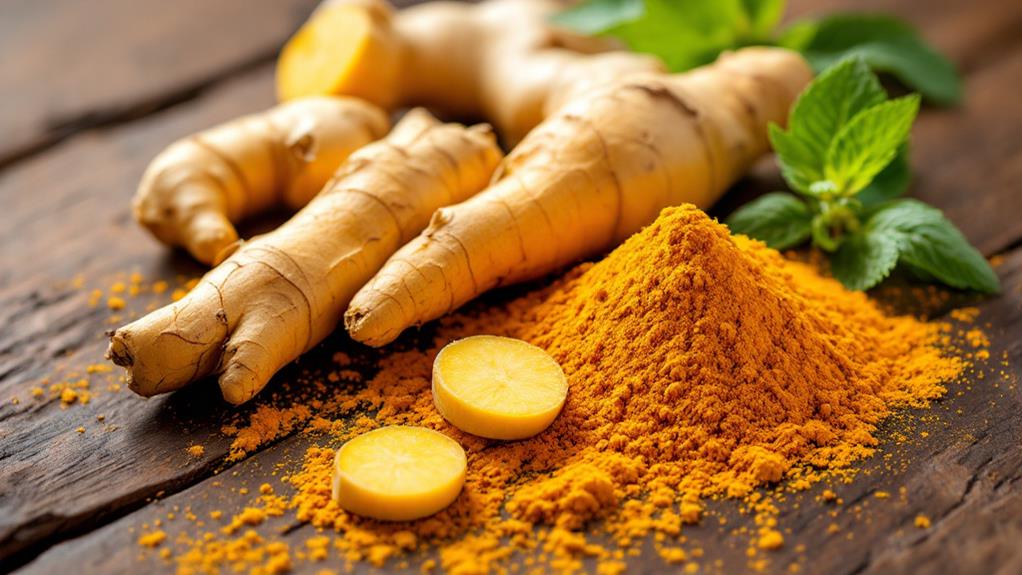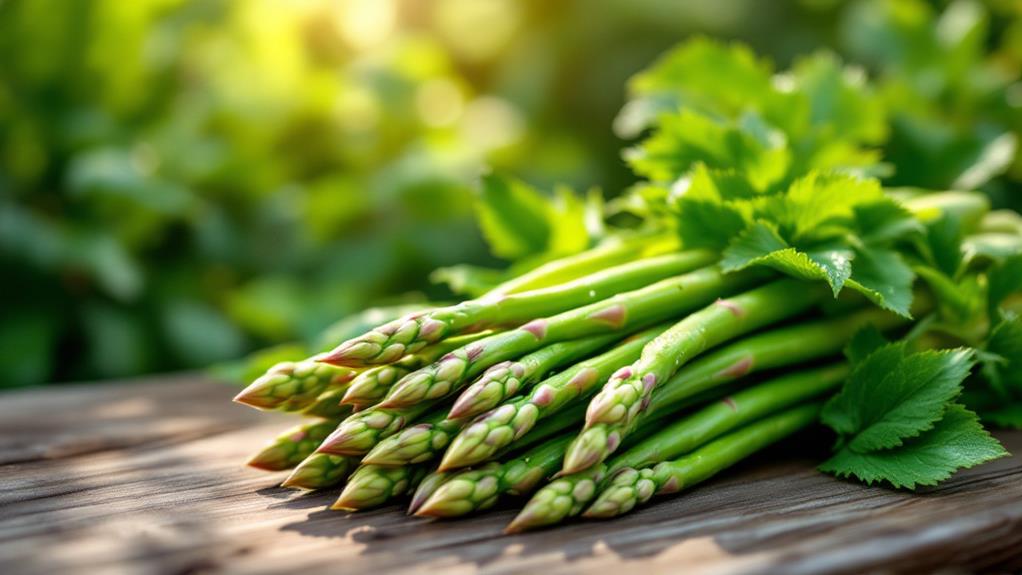Health Benefits of Curcuma Zanthorrhiza: A Powerful Herbal Remedy

Curcuma Zanthorrhiza, commonly known as temulawak or Javanese turmeric, is a powerful herbal remedy brimming with benefits. You'll find it excellent for digestive health, easing constipation and loss of appetite due to its ability to enhance bile production. Its anti-inflammatory properties can help with conditions like arthritis, while its antioxidants tackle oxidative stress, contributing to youthful skin and cognitive preservation. It even shows potential in fighting bacteria and supporting brain health. However, it's vital to use it with care, especially if you have liver conditions or are pregnant. There's much more to uncover about this remarkable plant.
Understanding Curcuma Zanthorrhiza
Originating from Indonesia and Southeast Asia, Curcuma xanthorrhiza, also known as temulawak or Javanese turmeric, is a fascinating member of the Zingiberaceae family. As an herbal medicine, this medicinal plant has gained recognition for its potent bioactive compounds, including xanthorrhizol and curcumene. These compounds are known for their antioxidant properties, making temulawak a popular choice for promoting health and wellness.
If you're looking to support your digestive system, Curcuma xanthorrhiza can be beneficial. It's traditionally used to alleviate digestive issues, providing relief with its natural compounds. In addition, its antioxidant properties help protect your body from harmful free radicals, enhancing overall well-being. This plant isn't just limited to digestive support; it's also known for aiding in the management of liver disorders. The bioactive compounds in temulawak have been shown to support liver function and may help improve liver health.
Traditional Medicinal Uses
While Curcuma xanthorrhiza is appreciated for its digestive and liver health benefits, its traditional medicinal uses in Indonesia are even more extensive. Known locally as temulawak, it's a staple in traditional medicine for treating numerous ailments. If you've experienced liver diseases, appetite loss, or gastrointestinal disorders like dysentery and constipation, it's likely that Curcuma xanthorrhiza has been part of your herbal remedy. This rhizome is a key ingredient in jamu, a traditional Indonesian herbal concoction, and is consumed in multiple forms—fresh, powdered, or as decoctions.
Beyond digestive health, Curcuma xanthorrhiza is employed for conditions related to rheumatism and arthritis, thanks to its anti-inflammatory properties. These properties help alleviate pain and swelling, making it a valued remedy in traditional medicine. Its ethnomedicinal applications are further supported by its antioxidant activities, which improve its efficacy in treating digestive and liver-related issues. However, while its traditional uses are widespread, scientific validation for some applications, especially in gynecological disorders, remains limited. This highlights a need for further research to fully establish its medicinal benefits. Nonetheless, its longstanding use in Indonesia speaks volumes about its healing potential.
Anti-Inflammatory Effects

Curcuma xanthorrhiza, often referred to as Javanese turmeric, packs a punch with its notable anti-inflammatory properties. This powerful herb owes its effectiveness to active compounds like xanthorrhizol and curcumene, which work wonders in reducing inflammation. If you're dealing with inflammatory conditions such as arthritis or rheumatism, C. xanthorrhiza could be a natural remedy to contemplate. Its use in traditional medicine highlights its cultural significance and long-standing reputation for soothing painful joints and muscles.
Studies reveal that the ethanol extract of C. xanthorrhiza has an impressive IC value of 292.38 ± 20.16 µg/mL for inhibiting glutathione transferase (GST). This suggests that it can modulate inflammatory responses, offering relief from discomfort. The herb's antioxidant activity also plays a vital role in its anti-inflammatory effects, as it considerably inhibits the generation of free radicals commonly linked to inflammation.
The therapeutic potential of C. xanthorrhiza for managing inflammation-related ailments is promising. While traditional use provides a solid foundation, emerging scientific evidence supports these claims and underscores the need for further research. By exploring this herbal remedy, you may find a valuable ally in combating inflammation.
Antioxidant Properties
Antioxidants are crucial defenders against oxidative stress, and Curcuma xanthorrhiza stands out with its impressive antioxidant properties. This remarkable herb boasts a significant antioxidant activity, as demonstrated by an IC value of 87.01 ppm for its ethanol extract. Such activity highlights its potential to effectively neutralize free radicals, which helps protect you from oxidative damage linked to different chronic diseases.
The secret behind C. xanthorrhiza's powerful antioxidant capabilities lies in its rich phytochemical composition. This includes over 40 identified compounds, such as xanthorrhizol and curcumene, that contribute to its effectiveness. These compounds are tested through antioxidant assays like DPPH and FRAP, which confirm their ability to combat oxidative stress.
Moreover, the presence of phenolic compounds in C. xanthorrhiza improves its biological activities, ensuring that you benefit from its antioxidant effects. These properties support your general health, making this herb a valuable supplement to your wellness routine. With research highlighting its benefits, C. xanthorrhiza is increasingly recognized as a natural source of antioxidants. This underscores its potential inclusion in dietary supplements and health foods, offering you a natural way to bolster your defenses against oxidative stress.
Digestive Health Benefits

Building on its impressive antioxidant properties, Curcuma xanthorrhiza also offers notable benefits for digestive health. If you've ever experienced digestive issues like constipation or loss of appetite, this powerful herb might be a suitable remedy. Traditionally used in Indonesia, Curcuma xanthorrhiza, or temulawak, has been a staple in local jamu formulations aimed at promoting digestive wellness.
The active compound, xanthorrhizol, plays an important role in enhancing bile production. This process is vital for the efficient digestion and absorption of fats, ensuring your digestive system operates smoothly. Ethanol extracts of Curcuma xanthorrhiza have shown significant antioxidant activity, which can help reduce oxidative stress in your gastrointestinal tract. This reduction in stress not only supports the general health of your digestive system but may also alleviate some gastrointestinal disorders.
Though anecdotal evidence supports its effectiveness in treating such disorders, more scientific research is needed to validate these claims. Nonetheless, the traditional use of Curcuma xanthorrhiza in addressing digestive issues underscores its cultural and medicinal significance. Incorporating this herb into your routine might just be the natural enhancement your digestive health needs.
Skin Health and Care
Javanese turmeric, or Curcuma xanthorrhiza, offers impressive benefits for skin health and care, thanks to its active compounds like xanthorrhizol and curcumene. These compounds exhibit remarkable antimicrobial properties, helping you tackle skin conditions such as acne and eczema. The anti-inflammatory attributes of Curcuma xanthorrhiza soothe irritated skin, reducing redness and swelling. By incorporating this potent herb into your skincare routine, you can harness its natural ability to calm and heal.
Curcuma xanthorrhiza's antioxidant effects are another reason it's celebrated in skin health. Antioxidants combat oxidative stress, a major contributor to skin aging and damage. By protecting your skin from free radicals, these extracts promote a youthful, healthy appearance. In Indonesian culture, Curcuma xanthorrhiza has long been used as a topical treatment for skin eruptions and irritations, underscoring its historical significance in herbal remedies.
Research also highlights Curcuma xanthorrhiza's ability to improve wound healing. Applying this herb to skin lesions may accelerate recovery and reduce inflammation. As a result, its inclusion in cosmetic formulations is gaining popularity. If you're seeking natural skincare solutions, this powerful herbal remedy could be a game-changer for your skin health.
Potential Neuroprotective Effects

While Curcuma xanthorrhiza has earned its place in skincare routines, its benefits extend beyond the skin, offering potential neuroprotective effects. Known as Javanese turmeric, this herbal remedy contains xanthorrhizol, a bioactive compound that may enhance brain-derived neurotrophic factor (BDNF). Increased BDNF levels are crucial for neuron growth and connectivity, which support cognitive function. Decreased BDNF has been linked to neurodegenerative conditions like depression and Alzheimer's disease, suggesting that C. xanthorrhiza might aid in maintaining brain health.
Antioxidant properties of C. xanthorrhiza are also significant. They protect neural cells from oxidative stress, a key player in neurodegeneration. By combating oxidative stress, this herbal remedy helps in preserving cognitive function and promoting brain health. Furthermore, animal and cellular studies have shown that C. xanthorrhiza may help clear amyloid plaques, which are closely associated with Alzheimer's disease, further showcasing its potential neuroprotective effects.
While the initial research is promising, more clinical studies are needed to confirm C. xanthorrhiza's effectiveness in improving memory and cognitive function in humans. Incorporating it in your wellness routine might offer you meaningful benefits for brain health.
Antimicrobial Activities
Curcuma xanthorrhiza, with its potent antimicrobial properties, effectively combats diverse pathogens linked to gastrointestinal disorders, including bacteria causing dysentery and diarrhea. You'll find that the ethanol extract of this powerful herb shows strong inhibition against these pathogens in lab settings, underscoring its potential as a natural antimicrobial agent. One of the key players in this process is xanthorrhizol, a major phytochemical in Curcuma xanthorrhiza. This compound disrupts microbial cell membranes and inhibits their growth, making it a formidable component in fighting infections.
Moreover, studies indicate that extracts from Curcuma xanthorrhiza possess antibacterial activity comparable to conventional antibiotics. This suggests you could consider it as an alternative treatment for infections, especially when seeking natural remedies. The herb's antioxidant properties further improve its antimicrobial effects. By reducing oxidative stress, which can worsen infections and inflammation, Curcuma xanthorrhiza not only targets the pathogens but also supports your body's general healing process.
Incorporating Curcuma xanthorrhiza into your wellness routine could provide a dual-action benefit: addressing gastrointestinal disorders through its antimicrobial action and promoting health with its antioxidant properties. It's a natural ally in maintaining gut health and combating infections effectively.
Considerations and Precautions

When incorporating Curcuma xanthorrhiza into your health routine, it's vital to be aware of certain considerations and precautions. Its safety profile, especially for long-term use, isn't well-established. Potential side effects like stomach irritation and nausea require you to monitor your body's response closely. If you have liver diseases or gallbladder issues, Javanese turmeric might increase bile production, possibly aggravating your condition.
Pregnant and breastfeeding individuals should exercise caution due to limited information on its safety during these periods. Furthermore, if you're on anticoagulant medications such as Warfarin, be vigilant. Curcuma xanthorrhiza can slow the breakdown of these drugs, raising the risk of bruising and bleeding, making regular blood monitoring significant.
Consultation with a healthcare provider is advised, especially if you have underlying health issues or are taking other medications. Your provider can help determine if Javanese turmeric is safe for your specific circumstances.
- Potential side effects: Stomach irritation and nausea.
- Liver diseases: May exacerbate due to increased bile production.
- Pregnancy and breastfeeding: Exercise caution due to insufficient safety data.
- Anticoagulant medications: Regular blood monitoring is vital.
- Consultation: Always consult your healthcare provider before use.




